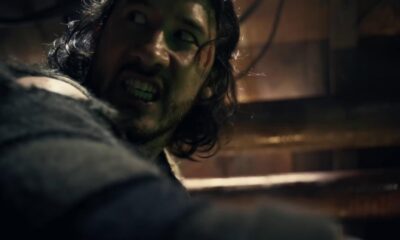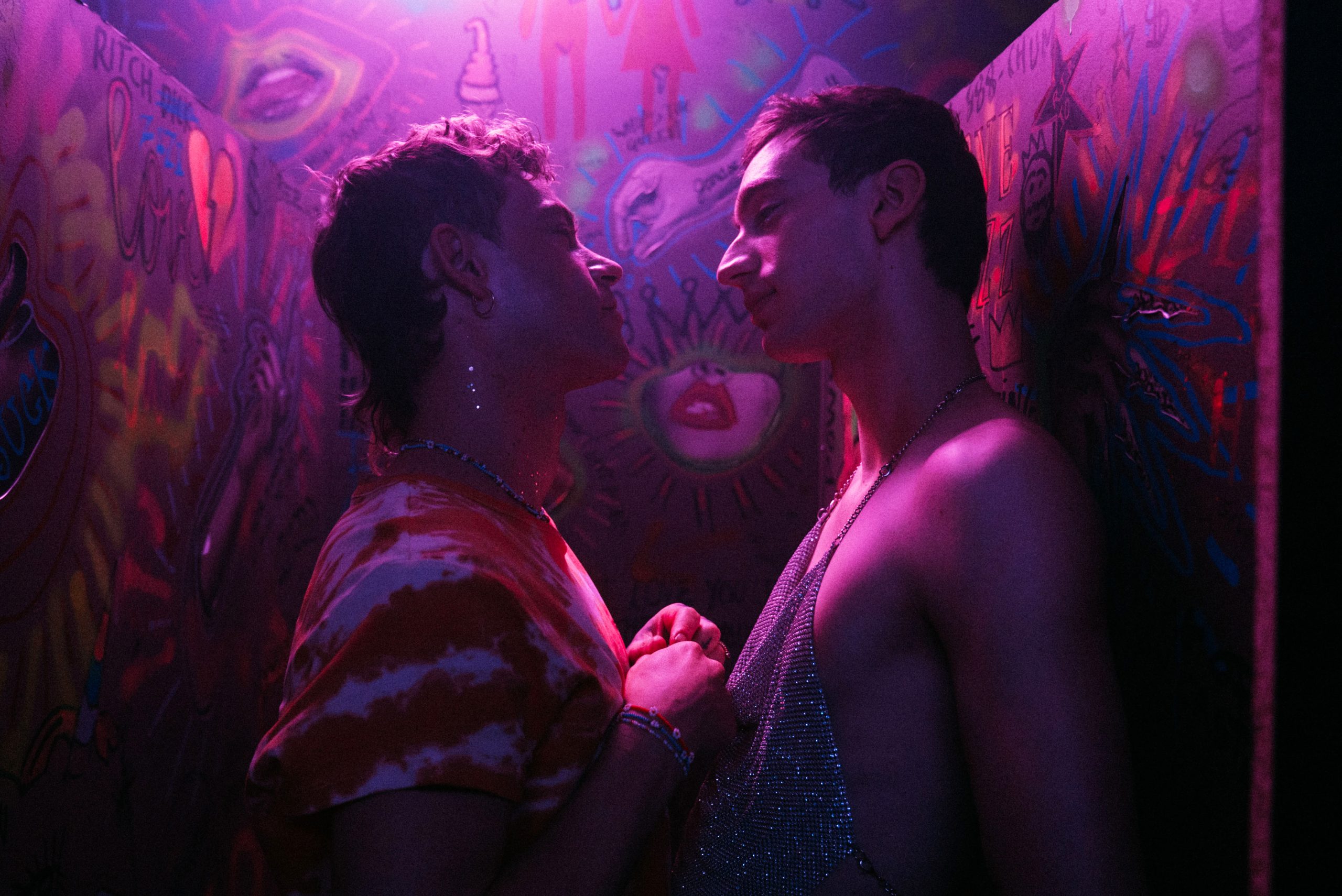
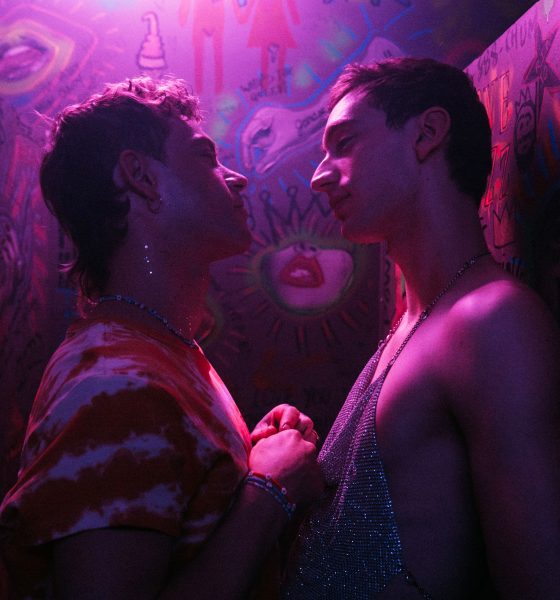
Interviews
Interview With Director Sophie Dupuis/Actor Felix Maritaud (Solo)
It’s been a long journey for queer drama Solo. Premiering at the Toronto International Film Festival back in 2023, UK audiences can finally see the French-Canadian feature in cinemas later this week (19 Sep). It follows a young drag queen, Simon (Theodore Pellerin), who enters a complicated relationship with new boy on the block, Oliver (Felix Maritaud), whilst dealing with a reunion with his estranged opera singer mother.
We had a video call with writer-director Sophie Dupuis and Maritaud before Solo’s UK release. They discussed approaching such a complex character, bringing the film’s incredible drag sequences to life, and queer cinema in the current political landscape.
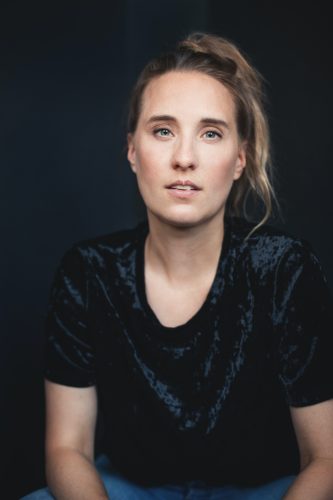

*Photo Credits – Eva Maude and Sara Merz*
How are we feeling about Solo finally coming out of the UK? It feels like it’s been such a long journey to get here.
Sophie: We released the film two years ago in Montreal today! So, yeah, we’re very happy because it’s always fun to know that there’s more audience for the film, and we know that this film is making people feel good and better, sometimes. I’m happy to bring it to the UK now.
Felix: Same. (laughs)
Do you think, with UK audiences, the reception is going to be the same?
Sophie: I don’t really know because it will be my first time in the UK. So I don’t know a lot about the culture and the people. We had a lot of different reactions, but the thing we know is that some of the audience are happy to be in touch with the art of drag, this way, for the first time. They discover it in a very nice way and they want to maybe be in contact with it a little bit more after they started [the] film, so it’s fun for that. I think a lot of people feel seen with this film, because of the way we showed the toxic relationship. Some people are like, “I had this experience and nobody understood me, and now I feel like maybe some people can understand me and I feel seen.” We hope for those reactions in the UK.
Sophie, you’ve worked with Theodore [Pellerin] several times now, but correct me if I’m wrong, is this the first time you two have worked together?
Both: Yes.
What was that initial meeting like when you both met?
Felix: Oh, that was really nice. [It] was just like becoming friends with someone. We were talking about the film, but as the film shows deep emotion and deep emotional understanding of relationships, we had to go through the thing of, “Okay, I’m gonna open my heart to you and you will do the same, then we are on the same level on understanding the subject that we are talking about.” And so it was really friendly. We had fun, mostly. We were really emotional. (everyone laughs)
Sophie: For me, I saw what Felix did before and the way he sees the world. And it was like, “Okay, we’re gonna send this script to this guy that I don’t know in real life, but that I know through his work.” And I was like, “If he doesn’t like the script, I have to go back and work on it.” Because for me, he would know if it’s bullshit. I wanted to have this feedback and he really loved it, and we had this really nice connection. So I was like, “Okay, I’m good.” It was like a gauge for me.
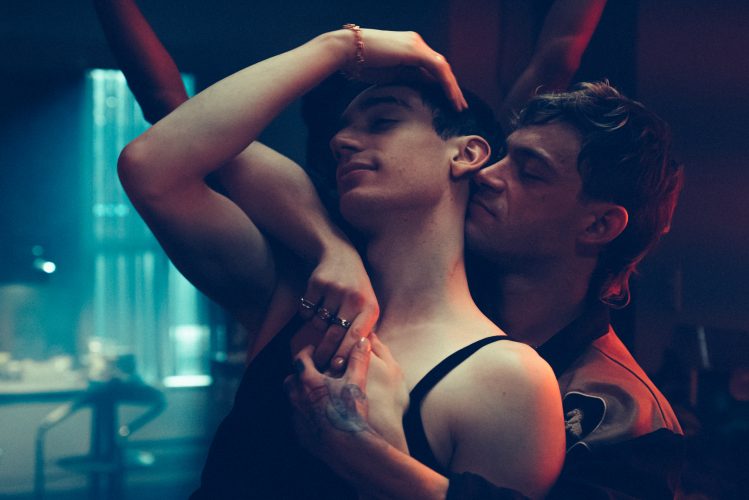
We have to talk about the drag sequences. They look incredible, they feel incredible; the performances come together with the production design and the cinematography. What, for each of you, was the most challenging aspect of bringing those to life?
Felix: There was a lot of work, a lot of learning how to change my body language. I had this psychological aspect of my character and I had to create a new layer of characterisation of the character through drag and the drag shows—they are linked to the narrative of the film. So there were so many layers to play on, and that was really interesting, I think the most challenging part, as it’s a lot of work too, [was] to dance in high heels and to wear all that stuff. At the same time, it was so good to embody the idea of gender as a performance, as something you’re affirming through gesture or through symbols that are linked to a society defining things. But it was clear for my mind, but not for my body, you know? Now I feel released of my masculinity because of this experience, because now I know that I’m just performing something.
Sophie: The biggest challenge for me was to represent it well, because I have so much love for that community and this form of art, and I’m not a part of it. I did a lot of research, but research is sometimes not enough. For me, it’s like a big thank you to drag artists and a love letter to them. I wanted to be very good, and I wanted them to be proud of this film. And now I know, because a lot of drag queens saw it, drag artists, and they all said we needed this film and now we have it. They were very happy with everything we show in the film; the good, the bad. I glamorised it a little on the stage because I wanted them to be shown as beautiful and wonderful and incredible. It was crazy because sometimes when we were shooting, people that were working on the film that didn’t really know anything about the drag scene and the drag art were like, “Wow, I want to go now, I want to know everything.” And that’s what we wanted to create. I think we did it, so I’m happy.
Oliver is an awful person. Such a toxic—
Felix: But that’s… His behaviour is awful. I can’t tell someone [that they’re] awful. The way people act can be awful. Someone is just someone.
Well, that leads into what I was gonna ask: what was the approach? Sophie, in writing the character and Felix, in playing the character.
Felix: Well, first, she [Sophie] was so well documented about the psychological aspects of the character; the narcissist profile is really well documented in psychology. So I wasn’t lost at all. We were talking a lot. We’ve been searching a lot of small gestures and small stuff. That was really good to do for the character because at no moment did we jade him, you know, we tried to approach him. We like as much humanity as we can, just to remind us that it’s humans doing things. Sometimes you only have one way, or a really limited way, to live your life and to react to your own feelings and emotions and what happens to you. The thing was just to remind myself that this all comes from a kind of mute suffering, and that was the most important part, that I can be conscious as an artist and a performer [with] what’s going on with him. But as I replay him, I can’t understand it, I can’t access it, because that’s the part of narcissists. They can’t access their own emotions and feelings, so they cannot push back on everybody else.
Sophie: We understood the survival mode he was in. His behaviour is not okay, but we understand why he’s doing it. And that’s what we were talking about every day when we were in [rehearsals], working on scenes. He’s not evil, he’s just trying to survive with his sufferings.
Felix: And the point was to create a space of disturbance, of something that is naturally quite mysterious and dangerous at the same time for Simon, to really go into this journey of rebuilding himself through the relationship and through experiences. I wasn’t looking for a past or a future or something. I was just looking for pure and muted reaction. I think we made that good, because all my friends are like, “You’re such an asshole.” “Don’t be my boyfriend.”
There’s no higher compliment than that, right?
(laughter)
Felix: I’m grateful to know how to do my job still. So, yeah, it’s okay to me. I accept it. I think they need representation too, in a human way. No monsters allowed, only people that are trying to do as [much as] they can, you know?
What I thought was really interesting with Solo was that it’s not just looking at toxic relationships; it’s a queer toxic relationship. To me, it added some interesting context that you don’t usually see in heteronormative media. Like the lack of self-love, I feel that’s quite prevalent within the LGBTQ+ community, or the nature of particular social groups. To either of you, what do you personally think the film’s queerness does or adds to the exploration of a toxic relationship.
Felix: As queer persons, we grew up by trying to adjust to a society that is not made or designed for us. Toxic relationships, our behaviours in relationships as survival mode, are quite common in queer communities, and that’s not something that has to be a judgement of our queer communities. It’s just a fact that comes from rejection over centuries. And the lack of acknowledging a culture that has been around forever in modern societies. It’s a little bit hard to put queer people and straight people on the same level in terms of relationships. It’s a journey to go there. It’s like feminism. For now, the objective is for a woman to be as equal as a man, but we are not there yet. We still have to work on it. So, this movie acknowledges the situation. It doesn’t judge or condemn it. We have the right to show that we can struggle in a relationship too, and we can struggle with emotion too. We don’t have to show our beautiful face all the time. We are just human.
Sophie: The other thing is that it was interesting to put the toxic relationship in parallel with the drag. I think every drag artist is discovering themselves through their character of drag, and they’re celebrating themselves and their queerness. And we have this character who is shining on stage in drag and who is starting to distance himself from himself in his relationship. So this opposition was interesting when I was writing, and I was discovering that through my writing.
It was interesting what you were saying, Felix, about feminism; how it’s not quite there, we still have a lot of work to do. I feel like queer cinema is currently in that position. There’s some amazing stories and narratives, but we need more. Especially when everything’s on fire and the current social and political climate is not great.
(everyone laughs)
To put it lightly. But do you think in terms of what we can do for our community, is it just a case that we need more queer films, or is there something different that we need to do to have that exposure to wider audiences?
Felix: It’s quite strange because I still want to believe. I want to believe that we can make our narrative seen through the mainstream, through the big media. But it’s always hard, you know, still at all times. When a film showing a gay relationship is making it in national and international releases, still in some countries people are gonna think just like Snoop Dogg, you know, “I’m afraid to see queer people kissing.” Okay, gangster, you so strong. The thing is that this exists, so I want to believe we can make it, but still, I think we have to do things for us to heal ourselves. This film was made to try to heal people, to try to help people grow through life and queer people. Right now, there’s a lot of conservative issues coming back from the last century. We have to protect queer narratives for them not to be taken by transphobic people or racist people, or killers and imperialists.
I’m not happy to say something like that. I wish I could say something way more positive, but it’s hard. I think for me and my friends, as for you in the UK, it’s the same right now. People are about to explode. Actually, a friend of mine from the cabaret scene in Paris is always saying, “When the world goes wrong, the cabarets are full, because people need to get in from that.” So I think this movie can be good, to go through this amazingly dark period.
-

 Featured Review3 weeks ago
Featured Review3 weeks ago28 Years Later: The Bone Temple ★★★★
-

 Movie Reviews4 weeks ago
Movie Reviews4 weeks agoPeople We Meet On Vacation ★★★
-

 Interviews2 weeks ago
Interviews2 weeks agoInterview With Director Philippa Lowthorpe (H Is For Hawk)
-

 Featured Review3 weeks ago
Featured Review3 weeks agoRental Family ★★★★
-
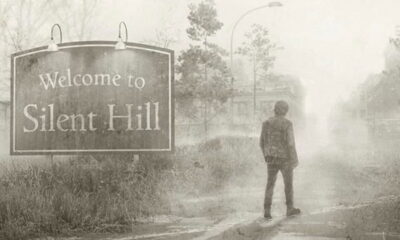
 Featured Review1 week ago
Featured Review1 week agoReturn To Silent Hill ★★★★
-
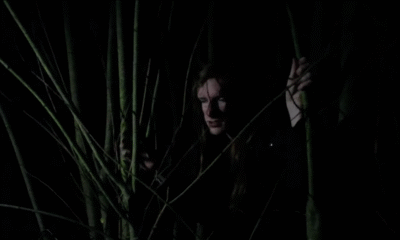
 Features2 weeks ago
Features2 weeks agoMM Shorts – The Estrogen Gospel (Robyn Adams)
-

 Featured Review1 week ago
Featured Review1 week agoScarlet ★★
-

 Features2 weeks ago
Features2 weeks agoRehna’s Round-Up: 2026 Awards Season So Far




